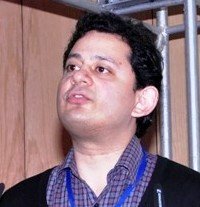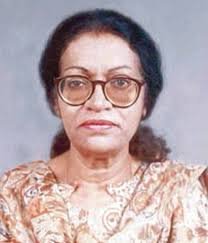
“Somebody speaks inside me day and night: Now it’s your turn…now you will see.” And then as the mystery gets deeper, the story’s mystery. These lines come at the climax of Sawari (Ride), the representative short story of Khalida Hussain, the writer and novelist who passed away last week on January 11 in Islamabad at the age of 81; we do not forget these lines, however hard we try. Khalida Hussain was among those writers whose writings were a distinctive capital of the Urdu short story. The details of the short-story writing of Khalida Hussain – a quaint and unique style she made her own – read like a short-story itself. She entered the field of short-story writing very gradually and cautiously, but travelled a long distance fairly quickly. The trace of her individuality became even stronger when in her initial period she wrote a short story like Sawari which was not only expressive of her artistic control, narrative power, expertise of technique and extraordinary ability to create allusion and innuendo within events; but is even today regarded as among the memorable short stories of our time. But a surprising turn in this story arrived when the writer of such unusual stories disappeared from the literary horizon. The pause of silence spanned years; but perhaps the journey of self-awareness continued in an internal manner. The spell of silence broke and the key to the alphabet was found. After many years she picked up the pen again and re-established her literary journey from right where she had left it. Then she began to cover new destinations. After this, she wrote constantly and continuously, and until her untimely death had a strong place among today’s eminent writers.

Khalida Hussain was born in Lahore on July 18, 1937. Her father Dr AG Asghar was the Vice-Chancellor of the Engineering University of Lahore. Despite being associated with the field of science, he was especially interested in literature and his children also developed the same thanks to the environment at home. Like her siblings, Khalida Asghar attained higher education. She did her BA from the Lahore College for Women and obtained an MA degree from Oriental College, Lahore. Khalida Asghar’s literary journey began right from her student days. Her first short story Naghmon ki Tanaaben Toot Gayeen (The Ropes of the Songs are Broken) was published in 1956 in a Lahore-based journal Qindeel. Then her story Dil Darya (The Heart Is a River), and following that Munni were published in Adab-e-Latif. With the publication of Munnialso came the following commentary of renowned poet Nasir Kazmi, ‘This short story is the katha of lone souls.’ In those days, Intizar Hussain used to be the editor of Adab-e-Latif. He wrote about the beginning of Khalida Asghar’s literary journey: ‘So this short-story writer has begun alongside the end of 1966. That was the time when the Urdu short story had just changed sides and a new style had begun to be nourished.’
 Nasir Kazmi opined that this short story was quite distinct from the traditional story and Intizar Hussain wrote that, ‘This deviation from the traditional short story soon settled into a new style and Khalida Asghar began to be identified distinctly among the newly emerging short-story writers, and then became a representative name in the symbolic and abstract short story.
Nasir Kazmi opined that this short story was quite distinct from the traditional story and Intizar Hussain wrote that, ‘This deviation from the traditional short story soon settled into a new style and Khalida Asghar began to be identified distinctly among the newly emerging short-story writers, and then became a representative name in the symbolic and abstract short story.
In the same period, she also wrote a short story Sawari. Soon a new turn arrived in her literary life. She got married to Iqbal Hussain in 1965 and adopted the name Khalida Iqbal – and subsequently Khalida Hussain – in place of Khalida Asghar. For approximately 12-13 years, no short story was written from her pen. A short time after marriage she shifted to Karachi with her husband and children, and began to teach at PAF Shaheen College. Around 1979, she re-entered the field of short-story writing.
 The first volume of short stories by Khalida Hussain Pehchaan (Identity) was published in 1981 and the second volume Darvaaza (Door) in January 1984, both from Karachi. The foreword to Darvaaza was written by renowned educationist and psychologist Dr Muhammad Ajmal.
The first volume of short stories by Khalida Hussain Pehchaan (Identity) was published in 1981 and the second volume Darvaaza (Door) in January 1984, both from Karachi. The foreword to Darvaaza was written by renowned educationist and psychologist Dr Muhammad Ajmal.
In a brief note at the beginning of this volume titled Aiteraaf (Confession), she wrote about her creative process:
‘When I want to feel myself, I write. The process of writing a story is an attempt to maintain the relationship of my own existence with both these worlds which flow within and without me, and so continuously that both mingle into each other; then when I feel my existence to be in danger, I am compelled to write. Maybe the fear of annihilation, the longing for eternity, the love of life force me to write.’
 Whatever the dynamic, Khalida Hussain’s literary journey continued till the very end. Her collections Masroof Aurat (Busy Woman), then Hen Khuvaab men Hunuz (We, Yet Exist in Dreams), Men Yahan Hoon (I Am Here) and Jeene ki Pabandi (Limits on Living) were published in 1989, 1995, 2005 and 2018 respectively. Her novel Kaghazi Ghaat (Paper Wharf), widely regarded as her magnum opus was published in 2006 from Lahore. With this novel the art of Khalida Hussain turned over a new side. While reading the novel, one repeatedly remembers the characters and environment of her short stories. I suspect that except the names, all the characters and events are real and factual, and who knows even the names might be real; but Mona, the novel’s central character who is a school and then college-going, sensitive and plain girl, is definitely Khalida Hussain.
Whatever the dynamic, Khalida Hussain’s literary journey continued till the very end. Her collections Masroof Aurat (Busy Woman), then Hen Khuvaab men Hunuz (We, Yet Exist in Dreams), Men Yahan Hoon (I Am Here) and Jeene ki Pabandi (Limits on Living) were published in 1989, 1995, 2005 and 2018 respectively. Her novel Kaghazi Ghaat (Paper Wharf), widely regarded as her magnum opus was published in 2006 from Lahore. With this novel the art of Khalida Hussain turned over a new side. While reading the novel, one repeatedly remembers the characters and environment of her short stories. I suspect that except the names, all the characters and events are real and factual, and who knows even the names might be real; but Mona, the novel’s central character who is a school and then college-going, sensitive and plain girl, is definitely Khalida Hussain.
In Kaghazi Ghaat, all matters, contradictions, failures, rise and fall, and the problems confronting this nation are discussed. The novel also beautifully sketches the changing feudal culture of Lahore. They were the ancient people of this city, part of every government. What was the world of the new middle class and how they were struggling to be part of the upper class; its narrative is very interesting. Even the title of the novel is very beautiful and thought-provoking.
 In addition to short stories and the one novel, she wrote critical essays and stories for children. Her critical essays are especially noticeable for deep attachment to literature and the insight created by a consciousness of life.
In addition to short stories and the one novel, she wrote critical essays and stories for children. Her critical essays are especially noticeable for deep attachment to literature and the insight created by a consciousness of life.
Khalida Hussain retired after a lifetime of teaching. She has been living in Islamabad permanently until she passed away.
Her five collections of short stories and novel were collected in one volume under the title Majmua and published from Lahore in 2008. In addition, her short stories had been published in various literary journals following her sixth collection.
Towards the end of her short story Zavaal Pasand Aurat (Banishment-Loving Woman), the female narrator’s train of thought is interrupted by a knock on the door. It was the government messenger, who had arrived with the arrest warrant; the city theolawgian (my own portmanteau corruption of the theologian and the lawyer) had prepared a charge-sheet. “To a banishment-loving woman who even during this national crisis thinks about a ‘fly’.” The late Khalida Hussain might have heartily agreed with this description of herself as the banishment-loving woman of Pakistani literature, a supposedly apolitical author, with multiple political allusions to be had in her work for those who care to look deeper; and who has left behind a dazzling but compact body of work which will stand the test of time for its freshness and uniqueness. This obituary piece was first published in Naya Daur Media (NDM), a bi-lingual progressive digital media platform in January, 2019.
 Raza Naeem is a Lahore-based social scientist, book critic, an award-winning translator and dramatic reader. He is the recipient of a prestigious 2013-2014 Charles Wallace Trust Fellowship in the UK for his translation and interpretive work on Saadat Hasan Manto’s essays. His most recent work is a contribution to the edited volume ‘Jallianwala Bagh: Literary Responses in Prose & Poetry’. He is currently the President of the Progressive Writers Association Lahore chapter. He can be reached at: razanaeem@hotmail.com
Raza Naeem is a Lahore-based social scientist, book critic, an award-winning translator and dramatic reader. He is the recipient of a prestigious 2013-2014 Charles Wallace Trust Fellowship in the UK for his translation and interpretive work on Saadat Hasan Manto’s essays. His most recent work is a contribution to the edited volume ‘Jallianwala Bagh: Literary Responses in Prose & Poetry’. He is currently the President of the Progressive Writers Association Lahore chapter. He can be reached at: razanaeem@hotmail.com

The High Asia Herald is a member of High Asia Media Group — a window to High Asia and Central Asia

